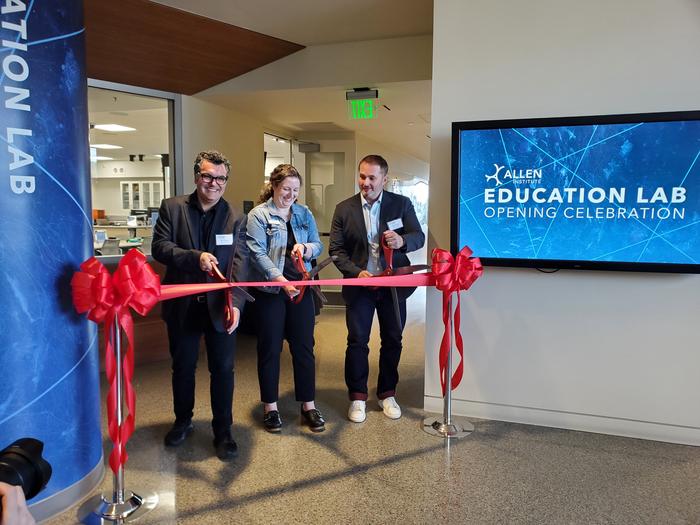Allen Institute Unveils Cutting-Edge Education Lab to Revolutionize Scientific Learning
SEATTLE, WA — May 23, 2025 — The Allen Institute today proudly announced the launch of its newest educational innovation, the Education Lab, a pioneering facility designed to immerse learners at every stage of their scientific journey in hands-on, authentic research experiences. Spanning 1327 square feet, this bespoke environment uniquely integrates advanced laboratory instrumentation with the Institute’s extensive open science resources, setting a new benchmark for science education and community engagement.
The Education Lab stands as a testament to the Allen Institute’s commitment to bridging the gap between laboratory research and education. Equipped with sophisticated instruments including ten high-performance microscopes—two of which are fluorescence-capable—a cutting-edge 3D printer, and a suite of computational workstations, the Lab offers a multi-dimensional exploration of biology and biomedical science. This synergy of tools allows participants to delve both physically and digitally into the microscopic and molecular worlds, mirroring the workflows used by professional researchers.
What distinguishes this facility from conventional educational spaces is its seamless access to real scientific samples and vast public databases maintained by the Allen Institute, renowned for its leadership in open science. Students, educators, and visiting scientists can manipulate actual biological specimens, analyze data derived from large-scale experiments, and engage with interactive datasets that illuminate complex biological systems. This direct interaction with data and samples cultivates a comprehensive understanding of modern scientific inquiry beyond textbook knowledge.
A core philosophy underpinning the Education Lab is to democratize access to authentic scientific experiences. Kaitlyn Casimo, M.Ed., Ph.D., manager of the Education and Engagement Program, emphasized that the Lab’s offerings are crafted for diverse learners—from high school students encountering biology for the first time to seasoned professionals seeking to deepen their technical expertise. This inclusivity is designed to nurture science literacy broadly, fostering critical thinking and enthusiasm regardless of future career paths.
Technological literacy is integral to the Lab’s programming. Participants gain proficiency in fluorescence microscopy, a powerful technique that reveals cellular components tagged with fluorescent markers, enabling visualization of dynamic biological processes in real-time. Additionally, the 3D printing capabilities provide an innovative avenue to create tangible models of molecular structures or biological tissues, enhancing spatial understanding of complex scientific concepts.
Beyond individual exploration, the Lab serves as a collaborative hub where learners engage in computational biology. Utilizing specialized software and open-access datasets, users analyze genomic sequences, simulate molecular interactions, and interpret high-dimensional data outputs. This computational immersion reflects the contemporary trend in life sciences where bioinformatics and data science play pivotal roles in deciphering biological complexity.
The Education Lab’s curriculum is thoughtfully designed to cultivate scientific inquiry and data literacy through immersive field trips and intensive summer programs. High school and undergraduate cohorts engage in experiential learning modules that simulate genuine research projects, thereby fostering skills in hypothesis formulation, experimental design, data collection, and critical analysis. Notably, a select cohort of Seattle Public Schools students will participate in a two-week, credit-bearing summer intensive focused on the transformative potential of open science, signaling the Institute’s commitment to educational equity.
Susan Russell, a science educator from Lynnwood High School, noted the profound impact of onsite lab experiences in reshaping students’ perceptions of science and scientists. By witnessing scientists from diverse backgrounds actively engaged in research, students gain relatable role models, which can dismantle stereotypes and inspire pursuit of STEM disciplines. This real-world exposure is instrumental in motivating young learners and expanding the pipeline of future scientific talent.
The Lab equally prioritizes faculty development, recognizing educators as catalysts for sustained change. Professional development workshops equip teachers with advanced laboratory techniques such as fluorescence imaging and DNA manipulation, alongside computational training in big data analysis and coding. Empowered with these skills and access to open educational resources, educators can enrich their classrooms and contribute to a wider community of practice that innovates science teaching methodologies.
Moreover, the Education Lab functions as a nexus for the broader scientific community by hosting technical trainings and workshops that supplement other Allen Institute events. This convergence facilitates cross-pollination of ideas between educators, researchers, and practitioners, stimulating collaboration and the dissemination of cutting-edge methodologies in open science.
Staffing the Lab is a dedicated team of educational scientists and technical experts committed to curating enriching, high-impact learning experiences. Their mission extends beyond instructional delivery to fostering a vibrant community of inquiry where curiosity sparks innovation. By intersecting hands-on experimentation with computational insights and open data, the Lab embodies a modern model of science education aligned with the rapid evolution of biomedical research.
As science increasingly relies on transparency, reproducibility, and data sharing, the Allen Institute Education Lab exemplifies how educational institutions can harness open science to equip learners with the skills and mindset to thrive in contemporary research landscapes. By immersing participants in authentic scientific practices—ranging from microscopic exploration to data-driven discovery—the Lab paves the way for a more inclusive, informed, and inspired generation of scientists and scientifically literate citizens.
In the face of pressing global challenges, the ability to engage critically with scientific information has never been more essential. The Education Lab’s innovative approach positions it as a cornerstone in nurturing the next wave of thinkers and problem solvers who will leverage science as a powerful tool to advance human health and understanding.
Subject of Research:
Education and Engagement in Open Science through hands-on laboratory and computational experiences.
Article Title:
Allen Institute Unveils Cutting-Edge Education Lab to Revolutionize Scientific Learning
News Publication Date:
May 23, 2025
Web References:
https://alleninstitute.org/person/kaitlyn-casimo/
Image Credits:
Allen Institute
Keywords:
Education, Scientific Community, Open Science, Microscopy, Computational Biology, STEM Education




